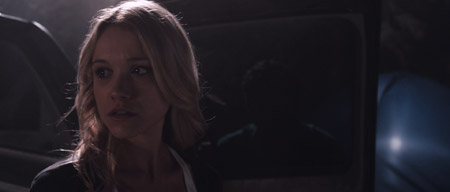**/****
starring Jennifer Lawrence, John Hawkes, Dale Dickey, Garret Dillahunt
screenplay by Debra Granik & Anne Rosellini
directed by Debra Granik
by Alex Jackson Those who loved Courtney Hunt's Frozen River are welcome to a second helping with Winter's Bone. I fear it might signal the start of a new genre: grass-and-granola cinema nobly detailing the plight of the working poor crossed with pulpy film noir. (Granola noir, perhaps?) The problem with these movies is that grass-and-granola and film noir just do not mix. The "plight of the working poor" is grossly oversimplified when narratively expressed in noir terms. The gangsters in Winter's Bone are meth dealers, but that's details–what really matters is that they're gangsters. Meth is reduced to a plot device, which does a great disservice to those whose families have actually been affected by the drug. And the "grass-and-granola" aesthetic grounds film noir in reality, neutralizing the dream-like abstraction endemic to the genre. Winter's Bone simply doesn't work in pop-movie terms. But it's not only that: combining "grass-and-granola" with film noir confuses the sociology of gender and class stratification with existential fatalism. Rhee Jessup (Jennifer Lawrence), the seventeen-year-old protagonist of Winter's Bone, is cast in the familiar role of Mom Who Will Do Anything For Her Children. With her own mother becoming increasingly senile and her father in prison for cooking meth, Rhee is forced to raise her younger brother and sister on her own. When Rhee discovers that her father has put up their house for bail money and skipped town, she risks her life by investigating his disappearance. Rhee is crudely idealized as a woman tough enough to go toe-to-toe with dangerous, wife-beating meth dealers and come out unscathed. While she's not a passive character, that isn't to say she has free agency. Rhee is forced to make these decisions out of love for her family and a desire to ensure they don't wind up homeless. Her actions are dictated by external forces. All Rhee wants to do is raise her kids. She has no sexual desire that we can ascertain, nor does she have any real drive to move up the social ladder. This is not film noir. In film noir, people are motivated by sex or greed and fate finds a way to fuck them over in the end. They can't change the outcome, but the genre is based on the notion that people have choices and are nonetheless too weak and fragile to make the right ones. Grass-and-granola is idealistic; film noir is cynical. They don't go together because they represent two fundamentally opposed worldviews.



